Unit 5 Music-Listening
文档属性
| 名称 | Unit 5 Music-Listening |

|
|
| 格式 | rar | ||
| 文件大小 | 596.5KB | ||
| 资源类型 | 教案 | ||
| 版本资源 | 人教版(新课程标准) | ||
| 科目 | 英语 | ||
| 更新时间 | 2011-12-07 00:00:00 | ||
图片预览

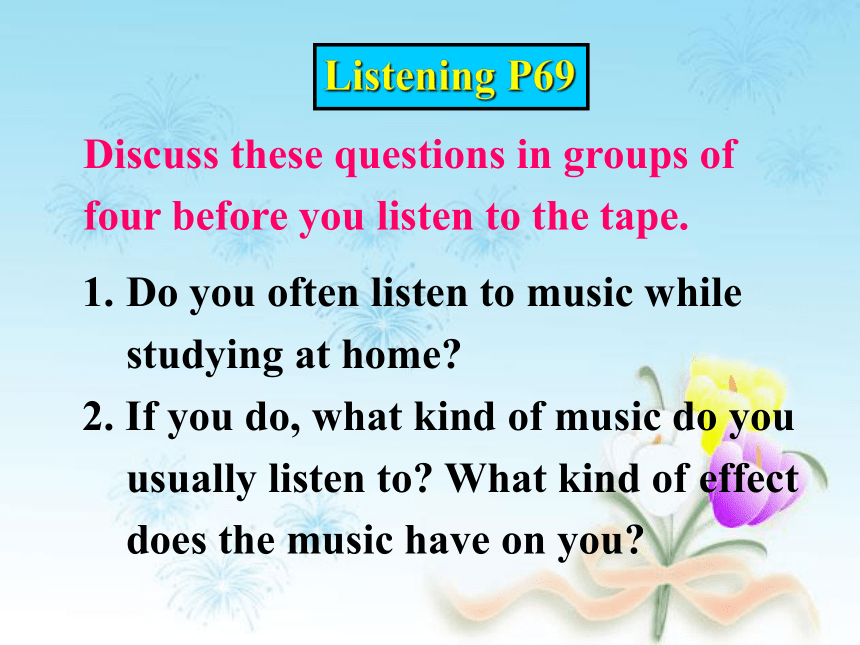
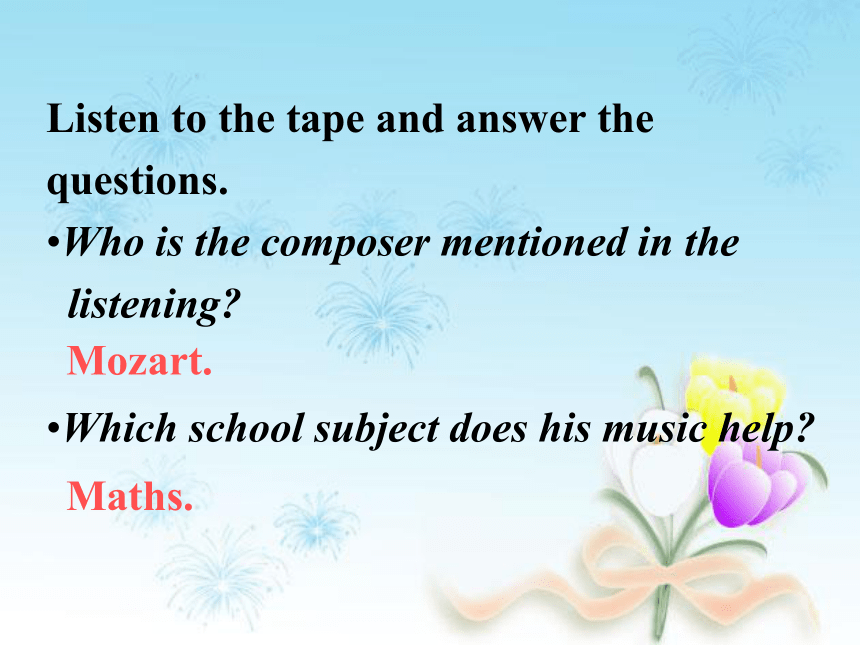
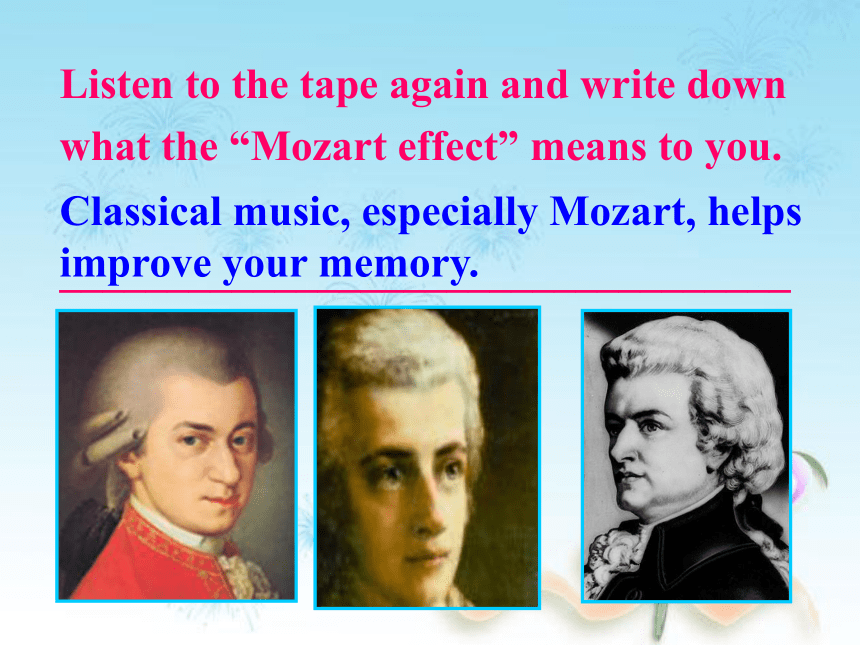
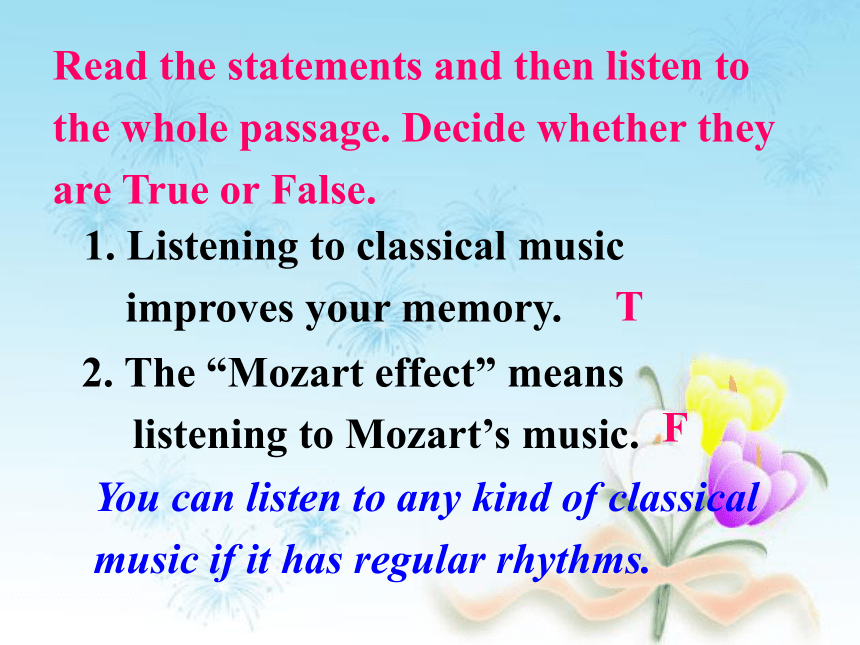
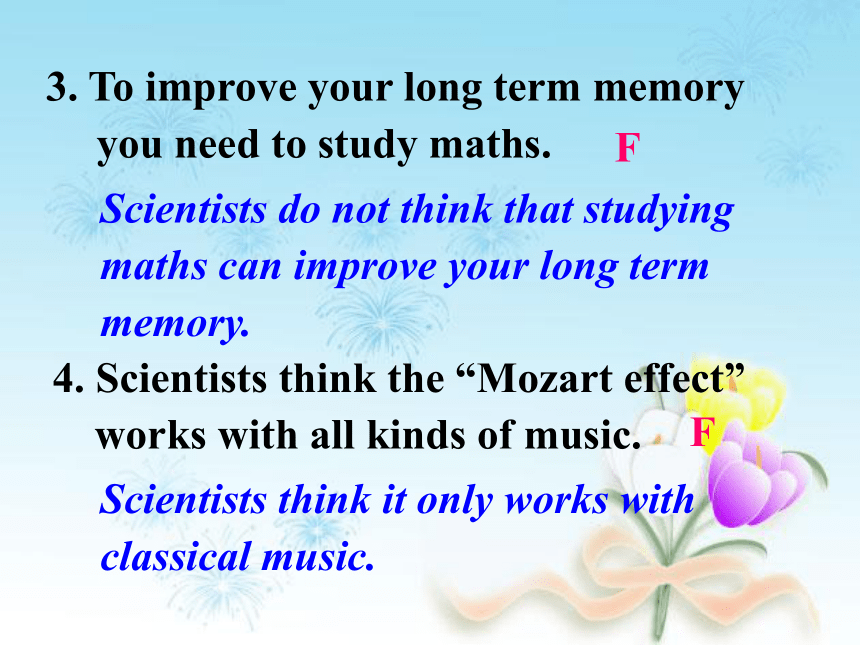
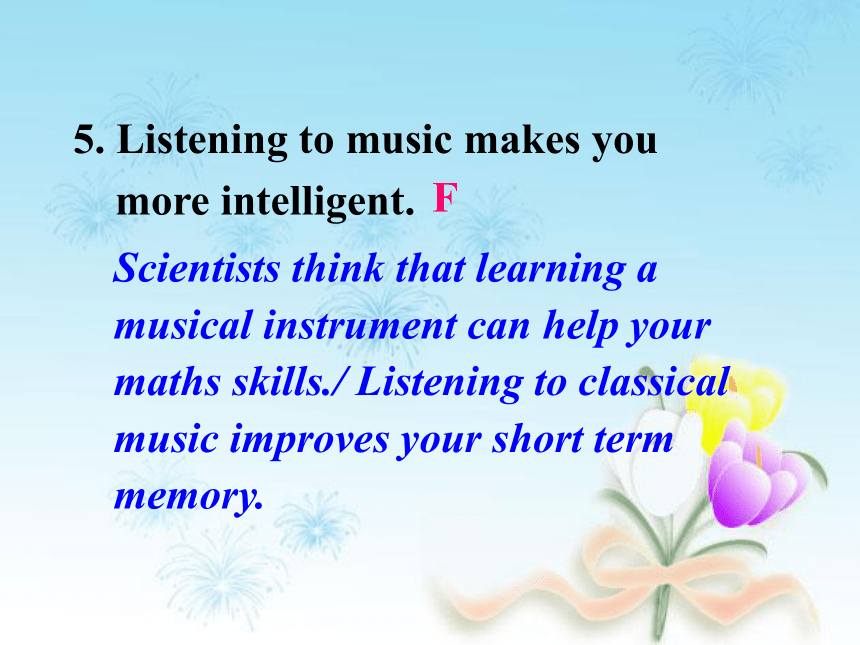
文档简介
(共17张PPT)
Listening
Listening P69
Discuss these questions in groups of four before you listen to the tape.
Do you often listen to music while studying at home
2. If you do, what kind of music do you usually listen to What kind of effect does the music have on you
Listen to the tape and answer the questions.
Who is the composer mentioned in the
listening
Which school subject does his music help
Mozart.
Maths.
Listen to the tape again and write down
what the “Mozart effect” means to you.
__________________________________
Classical music, especially Mozart, helps improve your memory.
Read the statements and then listen to the whole passage. Decide whether they are True or False.
You can listen to any kind of classical music if it has regular rhythms.
1. Listening to classical music improves your memory.
2. The “Mozart effect” means listening to Mozart’s music.
T
F
4. Scientists think the “Mozart effect” works with all kinds of music.
F
3. To improve your long term memory you need to study maths.
F
Scientists do not think that studying maths can improve your long term memory.
Scientists think it only works with classical music.
5. Listening to music makes you more intelligent.
F
Scientists think that learning a musical instrument can help your maths skills./ Listening to classical music improves your short term memory.
Listening task on P72
Work in pairs and make a list of any classical composers that you’re familiar with.
Beethoven
Mozart
Haydn
Tchalkovsky
This listening is about one of the most famous classical composer: Bach.
Bach’s background
Dates: March 21st 1658- July 28th 1750
Life: Johann Sebastian Bach was born into a musical family and so it was inevitable that he became a musician and composer. His first love was the organ and he composed many fugues (or complicated tunes with many parts that were used to make musical patterns).
He is most famous for these compositions and for his cantatas, St. John Passion and St. Matthew Passion. His most famous short piece is Air on a G String.
First-listening
Look at the chart and questions on the book and predict the content of the listening. Listen to the tape and check your predilection.
Listen to the tape again and underline the words you hear.
mathematical, pattern, jazz, folk, composers, choral, moving, beauty
Second reading
Information on Bach
Who did he write for
Where did he play it
What are the features of his music
Listen again and fill in the chart below.
God.
In the church.
Mathematical and with a special pattern.
Third reading
What type of music did he write
Why is he remembered today
Choral music.
For the beauty of his musical patterns.
Listening
Listening P69
Discuss these questions in groups of four before you listen to the tape.
Do you often listen to music while studying at home
2. If you do, what kind of music do you usually listen to What kind of effect does the music have on you
Listen to the tape and answer the questions.
Who is the composer mentioned in the
listening
Which school subject does his music help
Mozart.
Maths.
Listen to the tape again and write down
what the “Mozart effect” means to you.
__________________________________
Classical music, especially Mozart, helps improve your memory.
Read the statements and then listen to the whole passage. Decide whether they are True or False.
You can listen to any kind of classical music if it has regular rhythms.
1. Listening to classical music improves your memory.
2. The “Mozart effect” means listening to Mozart’s music.
T
F
4. Scientists think the “Mozart effect” works with all kinds of music.
F
3. To improve your long term memory you need to study maths.
F
Scientists do not think that studying maths can improve your long term memory.
Scientists think it only works with classical music.
5. Listening to music makes you more intelligent.
F
Scientists think that learning a musical instrument can help your maths skills./ Listening to classical music improves your short term memory.
Listening task on P72
Work in pairs and make a list of any classical composers that you’re familiar with.
Beethoven
Mozart
Haydn
Tchalkovsky
This listening is about one of the most famous classical composer: Bach.
Bach’s background
Dates: March 21st 1658- July 28th 1750
Life: Johann Sebastian Bach was born into a musical family and so it was inevitable that he became a musician and composer. His first love was the organ and he composed many fugues (or complicated tunes with many parts that were used to make musical patterns).
He is most famous for these compositions and for his cantatas, St. John Passion and St. Matthew Passion. His most famous short piece is Air on a G String.
First-listening
Look at the chart and questions on the book and predict the content of the listening. Listen to the tape and check your predilection.
Listen to the tape again and underline the words you hear.
mathematical, pattern, jazz, folk, composers, choral, moving, beauty
Second reading
Information on Bach
Who did he write for
Where did he play it
What are the features of his music
Listen again and fill in the chart below.
God.
In the church.
Mathematical and with a special pattern.
Third reading
What type of music did he write
Why is he remembered today
Choral music.
For the beauty of his musical patterns.
